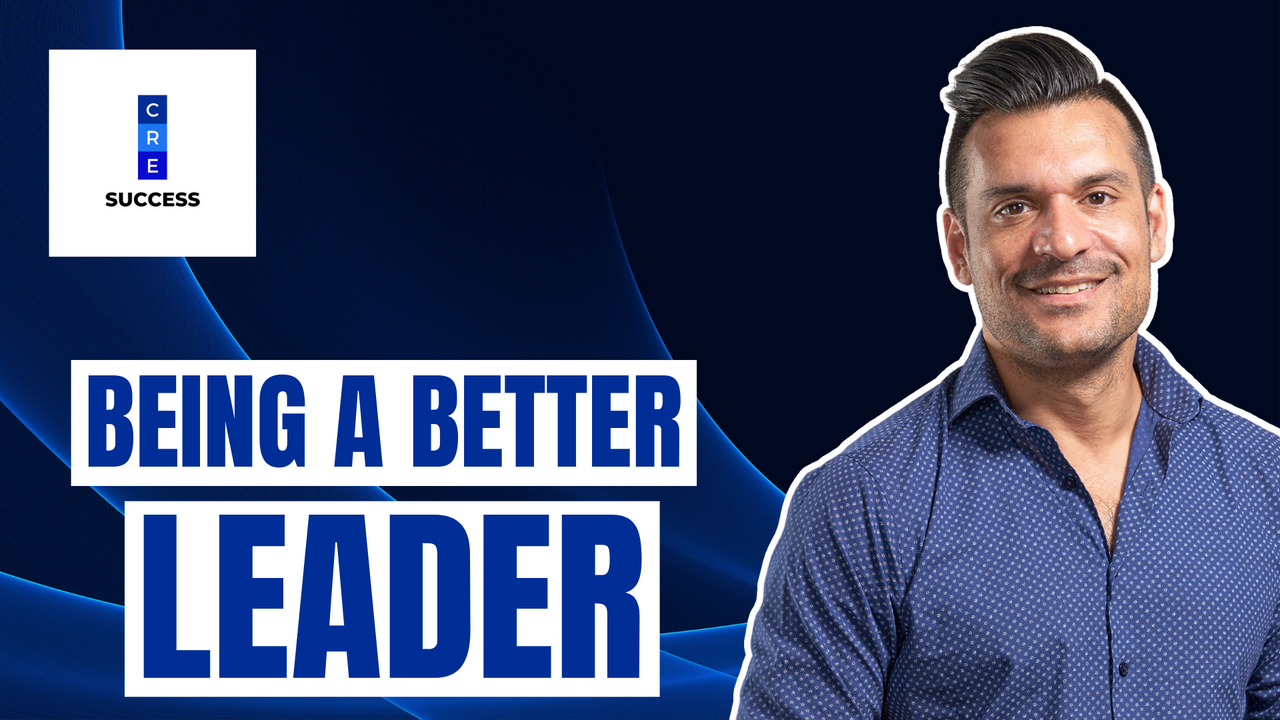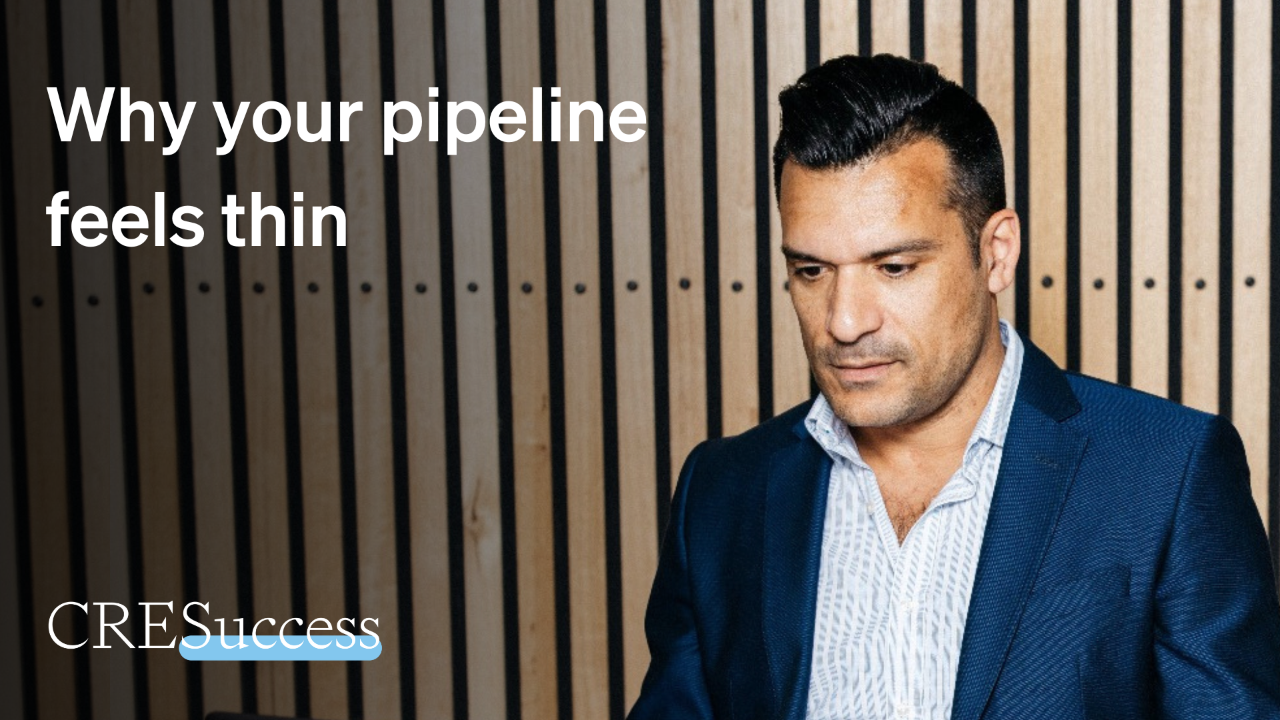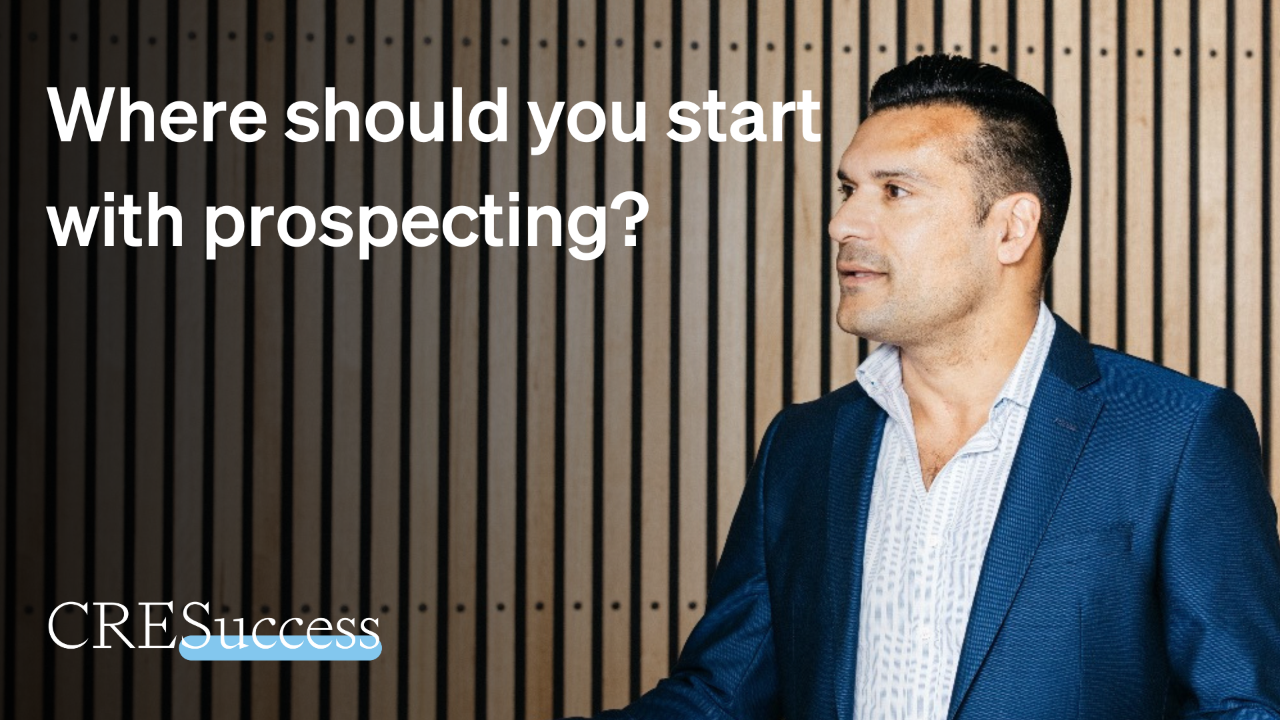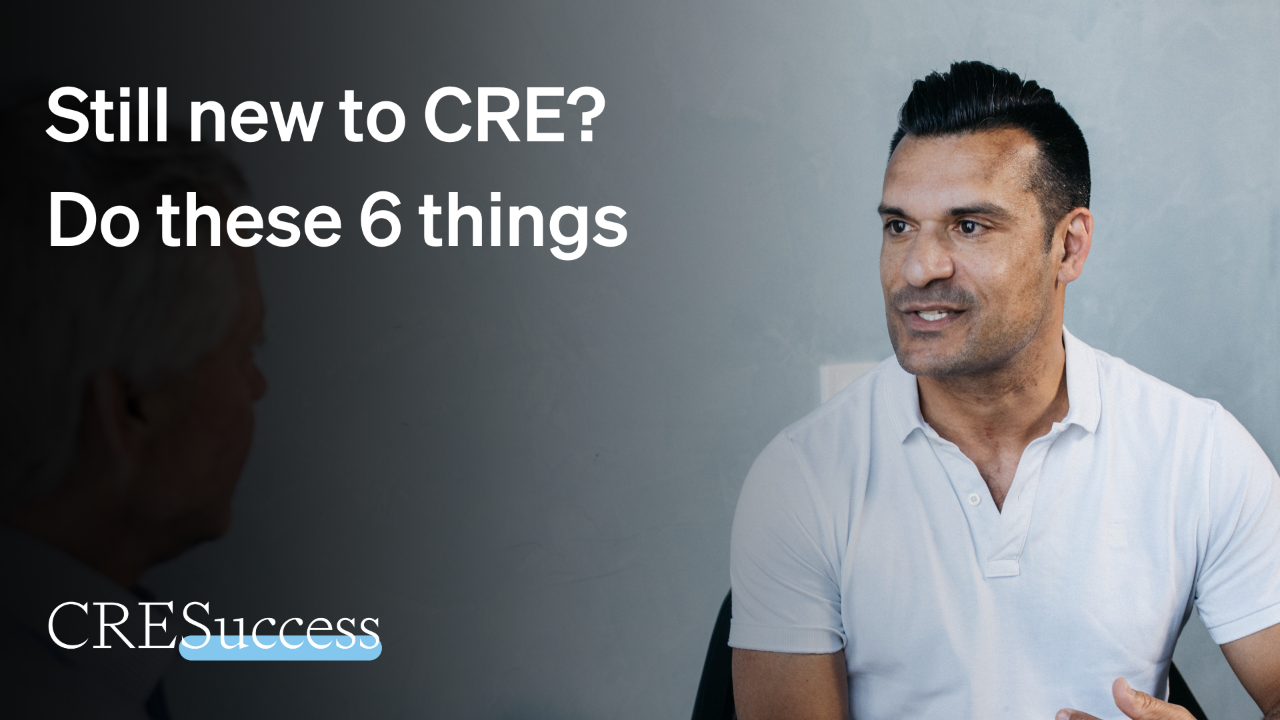How great leadership makes a big difference in commercial real estate
Jul 07, 2022
Yesterday I launched a new series of content about leadership in commercial real estate, kicking it off with John Casmon of the Multifamily Insights podcast interviewing me about that topic.
We discuss how individual performers can smoothly transition into a position of leadership, and how to identify people who are more likely to succeed at this.
It’s partly about being committed to providing great leadership, as opposed to just being attracted to the trappings of the position.
I've repurposed the interview from John’s podcast into episode 95 of CRE Success: The Podcast – I hope you find it entertaining and informative.
If you do enjoy it, and you’d like more information about how we help commercial real estate leaders to develop their people and grow their business, click here and let’s talk!
Episode transcript:
Hey there! Welcome to episode 95 of the show.
My name is Darren Krakowiak. I help commercial real estate leaders to develop their people and grow their business.
Today's episode is all about leadership.
And I'm going to be interviewed by John Casmon who hosts the show multifamily insights. His podcast is a successful one.
This is from Episode 407. So, lots of episodes in the can.
And this is the first in a series of episodes that we're running on leadership.
But I wanted to start with this interview because in this interview, John asks me some really good questions.
And he made some really perceptive observations, which showed that he really got it.
And I think this is a good way to set the scene about some of my ideas about leadership, as we go through the series of episodes.
The interview does start with John, asking me to introduce myself.
So, you may be familiar with parts of that backstory if you're a regular listener, but we do quickly get into talking about why I've decided to create a niche within a niche.
That is, CRE Success, is a business that's focused exclusively on helping people in commercial real estate.
However, more than 50% of our revenue comes from one leadership program that we offer to commercial real estate leaders.
So, our niched down niche is commercial real estate leaders. And the program that I'm talking about helps these leaders to build a team of top performers, so they can turn their business into a bigger asset that is not so reliant on their own production.
If you would like some more information about the program, cresuccess.co/agencysolutions
Agency solutions is the name of the program. It's all one word. We'll put that link in the show notes.
For now. I'll pass it over to John for today's interview.
-----------------
John Casmon
Darren Krakowiak has 20 years of commercial real estate experience. Racked up at firms like CBRE and JLL in Australia and Korea. And he has been a country head responsible for 300 employees, a top 1% agent representing office tenants, and a thought leader in research. Let's welcome to the show, Darren Krakowiak.
Darren Krakowiak
Thank you, John. Great to be here.
John Casmon
Absolutely. Darren, listen. I went over your bio at a very, very high level, take two minutes and fill in some of those gaps.
Darren Krakowiak
I've had, as you said 20 years in commercial real estate. I started out of uni at a firm called Airbus JHD, which is a property advisory firm. They did things like planning valuations and also property economics, which was forecasting turnover for shopping center owners when they expand their shopping center or add a new store. After that I worked at evaluations firm as the research head. And then I moved to JLL, which I'm guessing a lot of your listeners would know. Here in Melbourne was running their research team for a couple of years before in 2007. They sent me to Seoul, South Korea. And that was the start of 12 years living and working overseas for me, which saw me lead the office leasing and tenant representation teams in Korea for JLL. And then lead the CBRE Korea business from 2015 to 2018. I came home in 2019 back with JLL. And I sort of noticed in the marketplace that there wasn't a lot of focus in terms of one leadership as a competency within the industry, but also in terms of contents and professional development support specifically for people who worked in commercial real estate. I know, in the states have got, I guess an abundance of people who are providing that leadership that guidance that training. But there isn't really a lot in this part of the world in Australia, and also in Asia Pacific. Certainly, it exists in the residential sector, but not really in the commercial sector. So, I saw that as a bit of a gap in the marketplace, and I felt I had a contribution to make. So, in 2020, I launch the business CRE Success. I currently help commercial real estate leaders develop their people and grow their business. I do that through a signature training course called Top Performer. I provide free content through CRE Success: The podcast. And I also work with leaders one on one, to help them cultivate their vision, drive a stronger culture within the business that can create the environment that helps people succeed. And also put in place the structures that will make the business operate more efficiently and effectively and ultimately increase the value of the business. But when they looked at exit if in the cases where I'm working with people who own their own business.
John Casmon
Man, I love it. And you have so much experience, there from a global standpoint, we definitely make sure you tap into that. But just to replay a little bit of this. You were In Australia, born and raised in Australia kind of grew up there. And working with some of these larger firms JLL, CBRE. You start to get these opportunities to grow across the globe, right? You mentioned Korea, definitely down in Australia and doing some stuff in North America as well. So, you have this chance to really grow and expand and recognize that there's a gap in the marketplace, particularly with leadership, and being able to grow some of these leaders at these firms so that they can move into different positions, as well as position themselves with their firms for exiting in a few years. Talk to me a little bit more about that, right? Because when we think about CRE Success, now you host a podcast CRE Success. It feels a bit broad, right? And commercial real estate, as an industry has kind of a wide spectrum. So, talk to a little bit more about kind of more precisely the areas where you play and where you see most of the opportunity with clients you serve.
Darren Krakowiak
So, when I started the business, I probably didn't quite know where I wanted to focus. I knew that I wanted to focus on serving the commercial real estate industry. And I saw other experts who weren't commercial real estate experts. But we're experts in prospecting, in personal branding, in sales techniques, providing their expertise to the industry, but no one in this part of the world, as I said, supporting people to commercial real estate. But I didn't know specifically where I wanted to focus. So, I kind of like had to throw things against the wall and see what would stick. And where I came to was the leadership side of things. And when I reflected back on my career, and I thought about when I had good leaders that I reported to, there wasn't a lot of examples that came up, unfortunately. And I also realized that when I worked on my leadership, and when I really looked at myself, looked at my own skills, and try to improve as a leader, that's when I became, not only a more effective commercial real estate agents, but also, I was able to drive the performance and help others be the best that they can be. And I think in our industry, a lot of the time people get promoted into positions of leadership, as a reward for being top performers, not because they have a particular capacity, or competency or desire to take on that responsibility. So, leadership is something which I think is not particularly a focus in commercial real estate, people who are in leadership roles are often there. Because sometimes I would say there because they want the title, because they want the additional profit share, or they want control over who's splitting up the commissions. And they like, basically, a little bit of extra money. And people who do have good intentions of being an effective leader, or if they want to actually be they're not beyond the idea of just for the trappings of the position, or if they operate in their own business, and they want to be an effective leader, and they do want to help others be the best they can be. Quite often they haven't been exposed to effective leadership in the past, so they haven't had the chance to see what does good leadership look like. So, I've been trying to focus on that inside my business. But one of the ways that I can help leaders help their people is by also providing content that people in their team can consume. So, it's been about helping leaders with some of the areas I talked about before with vision and culture and structure. But also, it's providing a framework for members of their team to focus on areas like mindset, prospecting, personal branding, ways to win, what determines who's going to win a competitive process, efficiency and effectiveness, and also client accumulation. So that's available through a course that I've created. And also, I host, a monthly membership workshop, where staff of the leaders who I coach get to come to the monthly workshop to develop their skills. And as a person who's running a business that enables me to create an offer to commercial real estate leaders, which is not just trading one hour of my time, every month for some coaching. I'm actually providing more of a solution, which is around, you get coaching for yourself, there's an online platform, you get to send five of your staff members to a monthly workshop. And they also become part of an online community with access to curriculum. So, it's just a better offer. And I sort of discovered that as I was offering that to people, it was resonating more than trying to sell workshops, training, and other things that I was trying out in the first year in the business. So, the business is two years old this month. And I think because I'm passionate about leadership as well, I was able to actually communicate the value that I was able to offer in that area with more intent and authenticity.
John Casmon
I think the thing that's cool. It's like you understand the issue as well, right? So, when you talk about leadership, from someone who was in corporate America for 15 years, the point you made about someone being promoted to a position of leadership, not necessarily because they're a great leader or they're going to be a great leader, but because of a reward for something else that they've done great. That resonates. I was in the automotive space. And I worked for bosses who had no clue what they were doing. But they did great in some other realm of the business. And they had to be taken care of or promoted to acknowledge that. And that was always very frustrating when you work under a leader who really doesn't either care about being leader or doesn't know how to be a great leader. So that is not limited to the commercial real estate space. But it's certainly a space where those issues can continue to rise, because this is really a result driven industry. And with such an emphasis on sales, particularly the broker side, you can see how that can create a culture where it is more about sales and doing deals as opposed to really cultivating that next crop of young leaders, and give them the tools and training that you need. And the thing I love is that you didn't just train that individual and help them be a leader, but you create a platform for them to help the people underneath them. Which I think is one of the greatest things, because just that alone, at least is a demonstration of the individuals, the leader of them creating opportunities for those people underneath them. Like that's at least a first step that is probably more than many other people completely right that just when you think about leadership. Leadership is really about creating the opportunities for the people who work under you to thrive in creating that environment, give them the tools and the resources, and also giving them a little bit of space so they can grow. And having them the chance to be around other people in the space to work through ideas, to work through challenges to conceptualize with other people, that's a great way to get started. I want to ask you, what made you realize this was the approach you needed to take, as opposed to just creating a training platform just for those leaders?
Darren Krakowiak
I think it was going back and reflecting on what I was passionate about and what I was most effective at doing in my commercial real estate career. So, I was a good agent. And I probably top 1% In terms of my production at my peak. But when I really thrived was when I was leading others and helping them to be the best that they could be. And I really took the time to work on myself. And I think I had probably three A's that were working against me. I was sometimes had to beg good management issues. I was a little bit arrogant, and I drank too much alcohol. So, once I realized that I needed to work on those things. And the alcohol, unfortunately came too late. But I was definitely working on the arrogance that also the anger management and when I really worked on those things, and really focused on eliminating some of my blind spots. And these areas of emotional intelligence, which are important to not only a leader, but also to one's performance in commercial real estate. That is when I was able to become a really effective leader. And I realized that this is something that I can help others with. And as I started to read more books about my own entrepreneurship adventure, since I started this business and understanding more about the way that you set up a business, the way that we want to make it able to grow beyond our own production, then these are the sorts of things that I could be talking to commercial real estate leaders about as well. And there were things that I inherently understood, because I'd lead big businesses. And I think people who are running their own commercial real estate businesses, they do want support, they do want help, they're in that position, because they want to make a difference. They want to leave some sort of legacy in terms of the business that they're growing, whether it's providing opportunities for people coming through the door, whether it's selling the business for some big amount of money when they decide to retire. And these are all things that I can help people with. So, I guess the other way to answer your question is that the first year the business went okay, but it didn't go great. Because I didn't really have enough of a focus on what it was that I was trying to do. And like I said before, it was just a little bit too broad. And I think once you "the riches are in the niches," they say the United States, we say this niche in Australia, it rhymes nicely. So I like that one. The riches are in the niches. So, niching down and really saying, "Okay, I'm here to support people who are leaders in commercial real estate," I think has allowed me to have a more effective messaging strategy, and ultimately, to resonate more with the people who I'm trying to speak to.
John Casmon
What does it take to go from being a good real estate agent or commercial real estate agent to a good commercial real estate leader?
Darren Krakowiak
I think the first step is to be doing it for the right reasons. And that is because, like you said before, the role of a leader is to help other people to be the best that they can be, to create the environment where they can succeed. So, if you're doing it for the title, if you're doing it for the profit share, if you're doing it because you want to be in charge of other people, if you're doing it because of your ego, then that's probably the wrong reason. I don't think you necessarily have to be a natural leader or have those attributes which make a so called good leader. Because there are many different attributes, there are many different ways that you can be a good broker, a good leader, a good investor, there's not one particular type that's going to be effective. I think it's more about having the intention to be an effective leader and to do the work on yourself that's required to be the best leader that you can be. And if you set the intention to be the best leader that you can be and do the work on yourself to help you achieve that, then you'll improve as a leader. Because leadership is a skill. Yes, there are some inherent attributes, which makes some people more predisposed to leadership than others. But I think everyone can be a better leader if they decide to be. So, I think it's about just saying, "Yes, I want to do this, I want to take on the responsibility, I understand that my leadership is about the people who I'm leading, it's not about me, although my role in this leadership is to do the work on myself, to eliminate those blind spots, and to make sure that I'm creating the environment that is going to help other people succeed." If you don't want to do that, then you're better off being an individual contributor, because you'll make more money. Because leadership stuff, some people might get attracted to the idea of, "oh, I'm controlling the commission splits" or, "oh, the company's going to give me an 8% profit share for the business that I'm running." But there's going to be taking you away from where you're most effective if your heart and soul is not really in the leadership side. So yeah, it's about deciding to actually be an effective leader, if you're doing it for the right reasons, in my opinion.
John Casmon
All right, I appreciate that. You've had the ability of touching people from all sorts of different countries, specifically Korea and Australia and those who work in North America as well. I want to understand, when you talk to different leaders, especially in these different countries, in different cultures, what are some of the differences that people need to be mindful of when trying to grow as a leader and working across these different countries in different cultures?
Darren Krakowiak
So, I think that there is less of a focus on the individual and more of a focus on the importance of the group. And the simplest way that I learned this, when I moved to Korea, when I did some cultural awareness training was, there was two things. One was the way that Korean names said. So you put the family name first, and then the given name. And that's your name. And obviously, in Western culture, we put our family name last, and we put our given name first. And that was just a very literal sort of way to demonstrate that the group is more important than the individual. The bigger is more important than the small. So, the way that they quote, the date in Korea is year, month, day, rather than I think you guys go month, day, year, we go day, month, year in Australia. And it just shows that bigger is more important than the smaller. And I think that the group really matters. And I think in an industry where your individual performance is really something that matters, there is still an increasing focus on the group, the culture, the way that we interact with others, coming into western culture. And I think when people are working from home more, and they've got more choices about where they want to work, there's going to be even more of a need for leaders to provide an incentive for people to come into work. So, I don't know if we should go the full group over the individual that exists in Asia. But that's one thing that really sticks out to me the importance of the group. And the other way it was kind of described to me when I was in a leadership position was kind of like the difference between like a grandfather and a father, or a grandmother and a mother. And as in your early days of leadership, when perhaps you're running a small team, you're more like the Dad, you've got a discipline, you've got to be the bad cop and the good cop but when your grandfather, you can just play good cop. And I think when you're at a very senior position as well, it's not really up to you to be disciplining people who are very low or a couple of rungs below you. It's more about providing that strategic direction that guidance. And yeah, I just think that in Asia, there's just sometimes a bit more of a focus on family or focus on the group and relationships and taking things maybe a little bit slowly. It's less direct, it's more circular, less linear. And it requires a bit more patience. But maybe we can all learn to be a little bit more patient a little bit less direct at times. It can be frustrating; I think because you want to get to the point. Sometimes it doesn't happen quickly enough. But I think when you look at the world nowadays, that maybe there's something in that in terms of just taking a bit more time and being a bit more patient and focusing more on the group and getting to understand people and focus on relationships and all that good stuff.
John Casmon
Yeah, lots of good lessons there. For anyone who wants to learn a little bit more about some stuff you've got, like check out your website, cresuccess.co/links as well as the podcast, CRE Success: The Podcast. Be sure to check that out. Darren, I just want to thank you for joining us show up. Have a great day and we'll talk again soon.








